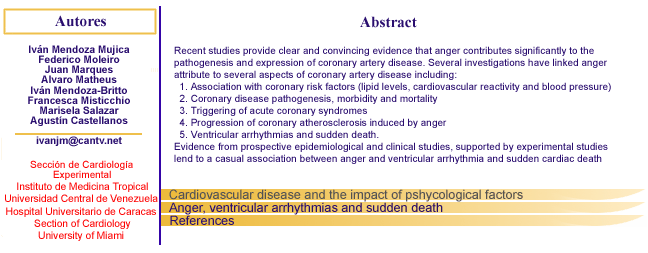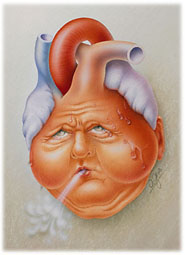



![]()
Cardiovascular disease and the impact of pshycological
factors
 Recent
studies provide clear and convincing evidence that psychosocial factors contribute
significantly to the pathogenesis and expression of coronary artery disease
(CAD) (1) This evidence is composed largely of data relating coronary disease
risk to five (5) specific psychosocial domains (1-3): 1) depression 2) anxiety
3) personality factors and trait. Anger, the focus of the present study is the
most important of them 4) social isolation 5) chronic life stress.
Recent
studies provide clear and convincing evidence that psychosocial factors contribute
significantly to the pathogenesis and expression of coronary artery disease
(CAD) (1) This evidence is composed largely of data relating coronary disease
risk to five (5) specific psychosocial domains (1-3): 1) depression 2) anxiety
3) personality factors and trait. Anger, the focus of the present study is the
most important of them 4) social isolation 5) chronic life stress.
Anger is a relatively stable personality trait that is manifested in the frequency, intensity and duration of the anger experience (4). Persons with high compared with low trade anger have rage and fury more often, more intensely and with longer lasting episodes (4).
Pathophysiological mechanisms
underlying the relationship between these entities and coronary heart disease
can be divided into behavioral mechanisms (4). Whereby psychosocial conditions
contribute to a higher frequency of adverse health behaviors, such as smoking
and poor diet, and direct pathophysiological mechanism, such as neuroendocrine
and platelet activation (1).
Studies have linked anger attribute to several aspects of CAD including (2,3):
Anger and coronary heart disease
The deleterious effects of anger and cardiovascular health are increasingly
gaining attention in the research literature (2,3). Evidence for an anger-CAD
association has been derived from studies that use different measures of anger,
different CAD end points and different study design (2). The prospective association
between anger and CAD was described initially by investigators from the Framingham
Heart Study (7), who reported that anger independently predicted the eight-year
incidence of CAD. More recently, Williams et al (2) reported in the ARIC study
that high trait anger was associated with and increased risk for CAD morbidity
and death independent of the established biological risk factors. There was
a dose-response relation between level of anger and CAD risk (2).
![]()